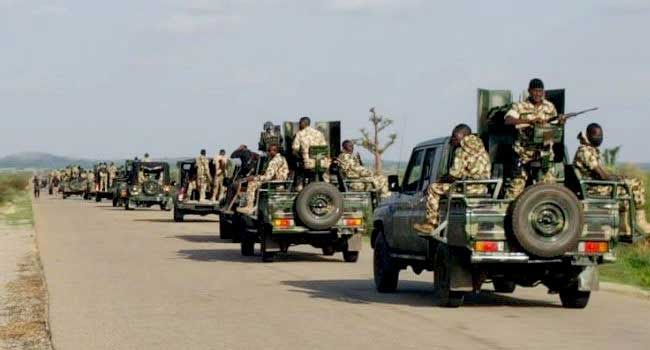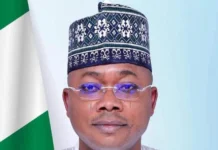 If we pick the Boko Haram insurgency which is the most threatening form of the spiral of violence in the North today, it is hard to believe that there is no agreement among the leading players as to the origin and nature of the revolt. What a former DG of the SSS told the NASS as to the trigger is different from what a former NSA believes to be the cause of the problem. To make matters worse, the president gave an even more different analysis from those of the security chiefs, even adding that his regime has been infiltrated by elements of Boko Haram. Boko Haram insurgents, on the other hand, have a completely different analysis of the origin and nature of their anger, emphasizing that they are victims of injustice. How can a country solve a problem which it does not understand? And why is it difficult to come to consensus as to what is on the ground? But this is not the time for blame games but for concrete suggestions.
If we pick the Boko Haram insurgency which is the most threatening form of the spiral of violence in the North today, it is hard to believe that there is no agreement among the leading players as to the origin and nature of the revolt. What a former DG of the SSS told the NASS as to the trigger is different from what a former NSA believes to be the cause of the problem. To make matters worse, the president gave an even more different analysis from those of the security chiefs, even adding that his regime has been infiltrated by elements of Boko Haram. Boko Haram insurgents, on the other hand, have a completely different analysis of the origin and nature of their anger, emphasizing that they are victims of injustice. How can a country solve a problem which it does not understand? And why is it difficult to come to consensus as to what is on the ground? But this is not the time for blame games but for concrete suggestions.
It is against this background that it makes sense to broaden the search for solutions to the impasse by more profoundly bringing back in two major actors in the North. That is the Northern governors and traditional rulers. Why is this important?
One reason is that, as it is now, the cycle of violence is still a peculiarly Northern Nigerian challenge although every insurgency and acts of violence is an attack on the Nigerian State and the monopoly of legitimate use of force that distinguishes it. It is peculiarly northern for the reason of exclusive Northern identity of the protagonists, the territorial specificity and even the fact that collective violence has remained a sad monopoly of the North, especially since the 1980s. Hence, the applicability of the puzzle of Africa’s conflict epidemic to Northern Nigeria.
When it was found that 70% of United Nation’s peace keeping deployments in the first decade of the post Cold War, (1989-1999) were in Africa, a particular Ibadan scholar of Peace and Conflict Studies asked whether Africa’s conflict epidemic is a function of an endemic catastrophe or conflict management failure. This poser is perfectly applicable to the North now. It is bad enough that every section of the huge region, from the emirate North to the Middle Belt where land usage, democracy and warsome nomadism are at issue, is wracked up in violence, it is worse that there are too many and different explanations for the conundrum.
As the only legitimate authorities in the region, the governors and the traditional rulers, therefore, have a special responsibility to request a special meeting with the president. The Northern elder statesmen and other senior citizens are there but the elite fragmentation in the North is such that there is no consensus among them at all, including the very definition of the North today. What this means is that the elite may not be in a position as an aggregate to play this role of a conclusive definition of the conundrum although some of them are very powerful at individual levels because they have the knowledge, the political technology to operate at multiple levels, the resources/means and, above all, interests at stake.
The third reason is that both the governors and the traditional rulers occupy the political cum security and the cultural space to know what actually happened as to the origin and nature of the insurgency. Not only that, they are all under siege and should be keen to speak the truth now as only God would know how much of the authority and leadership of the governors, emirs and chiefs the insurgency has eroded.
Finally, the two are still the major actors that have not given their own opinion of the crisis in any consolidated manner yet. That means they have an opportunity to come up with something newer and bolder, without fear of contradiction.
The assumption is that if the governors and the traditional rulers and/or former heads of state come out of a meeting with President Goodluck Jonathan and we still do not have a consensus on what triggered Boko Haram as well as a roadmap, then all hope is lost. Because, however one understands the insurgency in the North, the starting point for a peaceful resolution cannot be other than the correct reading of what happened. Why that correct reading has not been possible is part of the problem.
Meanwhile, is it possible to have peace in Nigeria without atoning for the blood of numerous, innocent Nigerians shed across the country in the last three decades? Many citizens have met death in circumstances from which they should have been shielded by the society such as stray bullets, accidental discharge, summary executions, ethno-religious violence, invasions, jungle justice, political violence and what have we! My fear is that so many children, women and absolutely innocent souls have perished in all of these and the society cannot have peace if it does not make peace with these victims of a soulless society.
It might be worth the while of President Jonathan and religious leaders in this country to reflect on this while working on peace in the North. The atonement process should not be a theatre for lawyers, liars and people who can cry beautifully for public attention as Cardinal-in-waiting, John Onaiyekan once maintained but something deep, sober and really soul edifying for the living. So that, at the end of the day, someone who lost almost all members of his family to a religious violence or communal uprising will not go away with so much bitterness against this society.
…We Haven’t Interrogated Obama
 America is set to return President Barrack Obama to power. Like most of Black Africa, our enthrallment with the Obama phenomenon has hardly gone beyond the pigmentation factor. We are probably entitled to it because his emergence as an American president rubbishes the identity of the African depicted in History, the African who is said to be nothing.
America is set to return President Barrack Obama to power. Like most of Black Africa, our enthrallment with the Obama phenomenon has hardly gone beyond the pigmentation factor. We are probably entitled to it because his emergence as an American president rubbishes the identity of the African depicted in History, the African who is said to be nothing.
However, it still smacks of our metaphysical habit of thinking that Nigeria has not really interrogated Obama from the point of view of our own national security. The United States of America is operating in a global system which goes beyond the limits of empire. There are things which are within its control while there are many others outside of its control. Since no president can perform outside of the circumstances which s/he is a product of, we ought to have focused a lot on the location of Obama, the combination of objective and subjective forces that brought him to power, propelled him and are shaping his regime/responses to the burden on the American State.
It is all easy to see that Obama has been a lot about fence mending, leading America a bit back from the bush where George W. Bush was leading it into. The issue for us should have been where we locate our national interest therein, how do we start preparing to locate ourselves so as to benefit from the agenda if there are benefits and vice versa?
Sadly, none of our think-tanks have done anything like that. Neither NIIA nor NIPSS and certainly not the Institute for Peace and Conflict Resolution, (IPCR) have done anything there in line with their mandate. It is not in their mandate to do so secretly because these are no spy agencies. Great if we can get our acts together as soon as we know the results of today’s election.
…Christopher Ejembi aka ‘Oblue’: Death of the Driver’s Driver
 There are very few drivers like him. Twenty seven solid years on the wheel and he never had an accident for once. More than that was the magical way Federal employment transformed a complete lumpen to an elite almost, both in composure, attitude, knowledge of and observance of social protocols. That is what makes his death last Friday very painful even as no one can undo death, however it came.
There are very few drivers like him. Twenty seven solid years on the wheel and he never had an accident for once. More than that was the magical way Federal employment transformed a complete lumpen to an elite almost, both in composure, attitude, knowledge of and observance of social protocols. That is what makes his death last Friday very painful even as no one can undo death, however it came.
Officially known as Christopher Ejembi but more popularly known as ‘Oblue’, he was employed on May 12, 1985 by National Planning Commission in Lagos. He arrived Abuja in 1996 but now as a driver with the Federal Ministry of Transport, ending up with Revenue Mobilisation and Fiscal Commission much later. By then, he was no longer a run of the mill driver, having been formally trained in defensive driving and informally schooled by Lagos itself. It is such that you entertain no fears if ‘Oblue’ was driving your children home for Xmas or sundry occasions. If he ever had an accident, it would never have been for reasons of sloppy craftsmanship. He was very methodical and totally in control, with an unsurpassable dexterity on the wheel.
Part of his transition to a new class was building a beautifully designed own house in Abuja, the home of children of numerous relations of his. Added to that was a sense of leadership, manifest in his prolonged chairmanship of his village, clan and district meetings in Abuja. And he was heavily involved in the Catholic Church.
He knew he was diabetic and he carried its food burden very well. Suddenly, complications arose, especially after being away from Abuja for three weeks. Hospitalization followed. Then on Friday, November 2nd, 2012, at 4 a.m, he gave up the ghost at Asokoro Hospital, Abuja, leaving such a big gap at many levels that would be impossible to fill very quickly.
Association with his burial has been a profound source of Sociological education for this columnist on how the other half live and die in present day Nigeria. May God admit him to heaven while giving those he left behind the mind to bear his exit!


